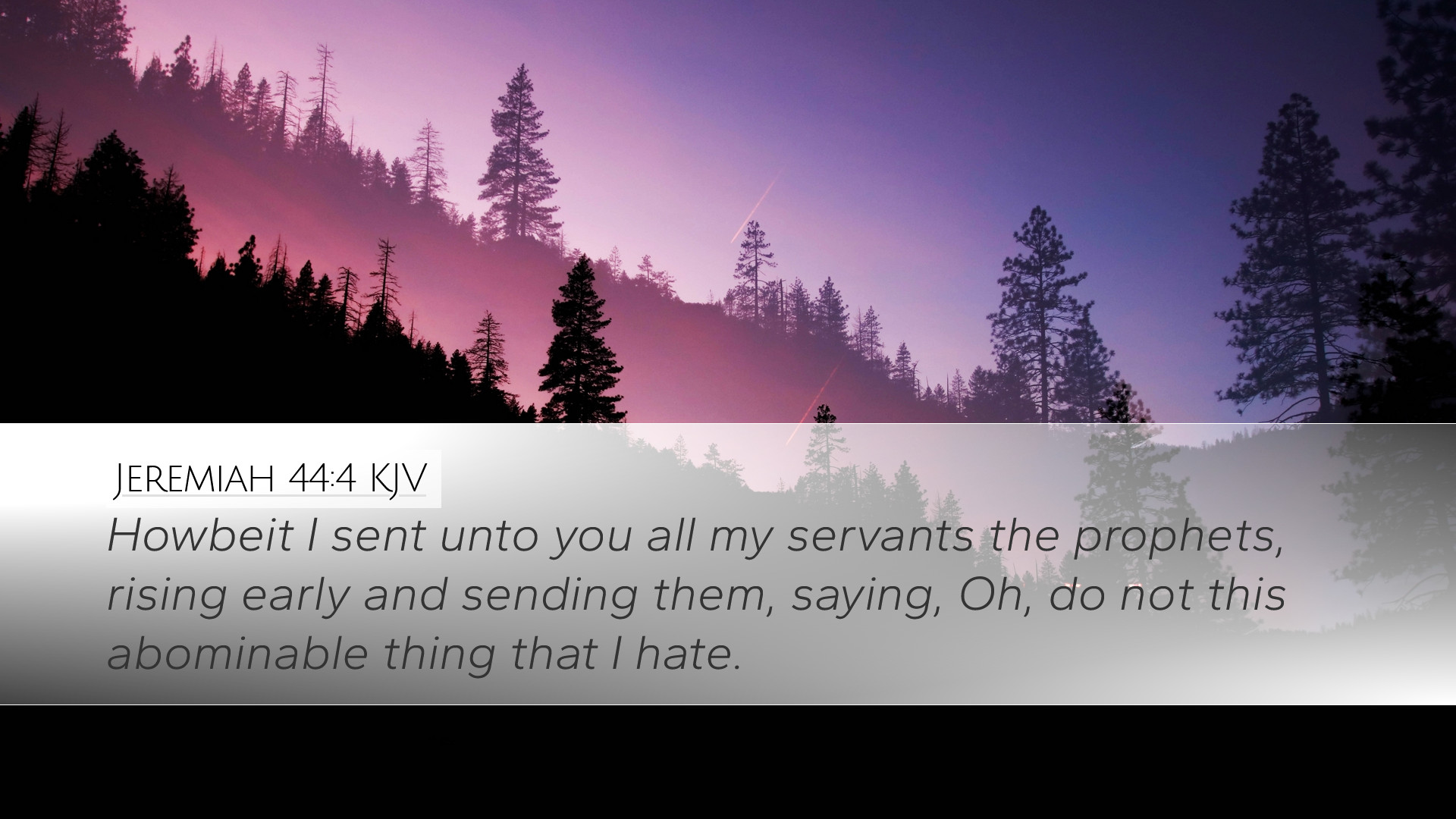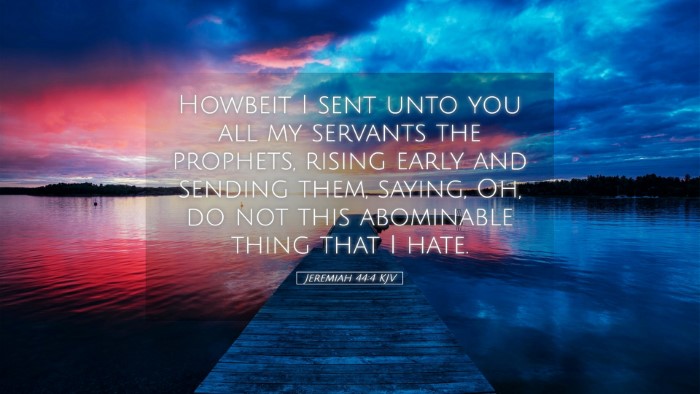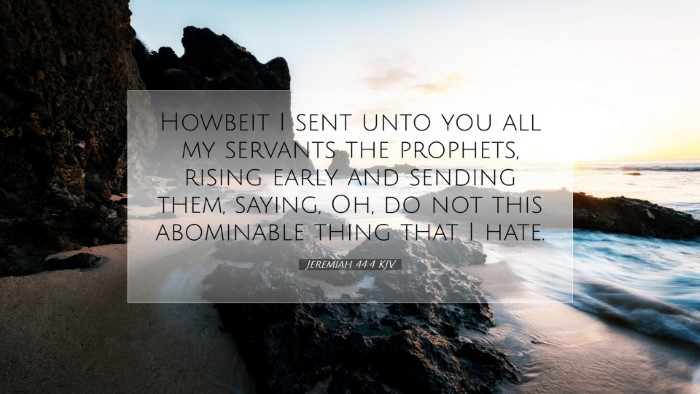Bible Commentary on Jeremiah 44:4
Jeremiah 44:4 (KJV): "And yet I sent unto you all my servants the prophets, rising early and sending them, saying, Oh, do not this abominable thing that I hate."
Introduction
The book of Jeremiah stands as a poignant testament to God's relentless call for repentance among His people, particularly as the nation of Judah faces impending doom due to their disobedience. In Jeremiah 44:4, we see God lamenting over His people's refusal to heed the warnings delivered by His prophets.
Contextual Overview
This verse is situated within a broader narrative where the remnants of Jerusalem, who had fled to Egypt after the fall of Jerusalem, are being admonished for their continued idolatry. They turn to the very practices that led to their destruction. The still-small voice of their previous prophetic warnings serves as a backdrop to their stubbornness.
Insights from Commentaries
-
Matthew Henry's Commentary:
Matthew Henry emphasizes God's patience and persistent outreach through His prophets. He points out that "rising early" denotes God's urgency and diligence in warning His people. He highlights that God's message was clear and consistent: to turn away from the abominations that He detested.
Further, Henry observes that the term "abominable thing" signifies the severity of their sins, contrasting the holiness of God with the defilement of idol worship. This juxtaposition serves to remind believers of the gravity of sin and the consequent call to repentance.
-
Albert Barnes' Notes:
Albert Barnes underscores the significance of divine warnings. He notes that God "sent unto you all my servants the prophets" illustrating the breadth of God’s efforts to bring His people back into right relationship with Him. He discusses the repeated call for repentance as an invitation to relationship rather than mere condemnation.
Barnes also revisits the historical context, pointing out that the people's setting in Egypt is emblematic of their unbelief and rebellion. They have chosen to cling to their sinful habits in a foreign land rather than align themselves with God’s will, a lesson for believers in the potential straying that can occur after deliverance from sin or when faced with trials.
-
Adam Clarke's Commentary:
Adam Clarke provides insight into the emotional aspect of this warning. He articulates God’s role as a father who, despite being rejected, still reaches out to His children. He comments on the phrase "Oh, do not this abominable thing," highlighting the pathos evident in God’s words, suggesting a divine sorrow over the people’s choices.
Clarke also investigates the specific "abominable things" referenced, suggesting that idol worship, particularly in the context of the Egyptians, was not merely a cultural practice but an affront to God’s sovereignty and purity. He reflects on the implications for contemporary believers, cautioning against any forms of idolatry that can seep into the modern worshipping community.
Theological Reflections
Provocation to Action: The verse serves as a theological reminder of the importance of heeding God's voice. The repeated sending of prophets is indicative of God’s desire for reconciliation and relationship with humanity. This verse invites pastors and theologians to reflect on their own role as messengers of God’s truth.
The Nature of Divine Love: The emotional plea encapsulated in this verse reveals God's character. Rather than condemning His people immediately, He opts for a relational approach, showcasing His loving patience. This aspect of God’s nature urges students of theology to appreciate the divine balance of justice and mercy.
Practical Applications
-
Listening to Divine Warnings:
Just as the people of Judah were warned, today's believers must cultivate the sensitivity to recognize and respond to God's warnings. This calls for a posture of humility and openness to correction, facilitated through prayer and the study of Scripture.
-
The Role of Prophets and Teachers:
In the contemporary church, dedicated pastors and teachers serve a prophetic role. This verse affirms the significance of proclaiming truth even in the face of resistance, highlighting the necessity for leaders to courageously teach against popular but erroneous practices.
-
Repentance as a Continuous Practice:
Jeremiah 44:4 serves as an imperative for the continuous act of repentance. Pastors and church leaders are encouraged to lead congregations in practices that foster an environment of turning away from sin, thus aligning with God’s desired path for community life.
Conclusion
In conclusion, Jeremiah 44:4 encapsulates not only a warning but also a heartfelt plea from God to His people. Through insights gained from various commentaries, theologians and scholars are reminded of the delicate interplay between God's justice and mercy, the necessity of prophetic voices in the church, and the vital importance of repentance in the believer's life. This verse challenges us to reflect on our faith journey and the idols that may linger in our lives, urging a return to the heart of God.


